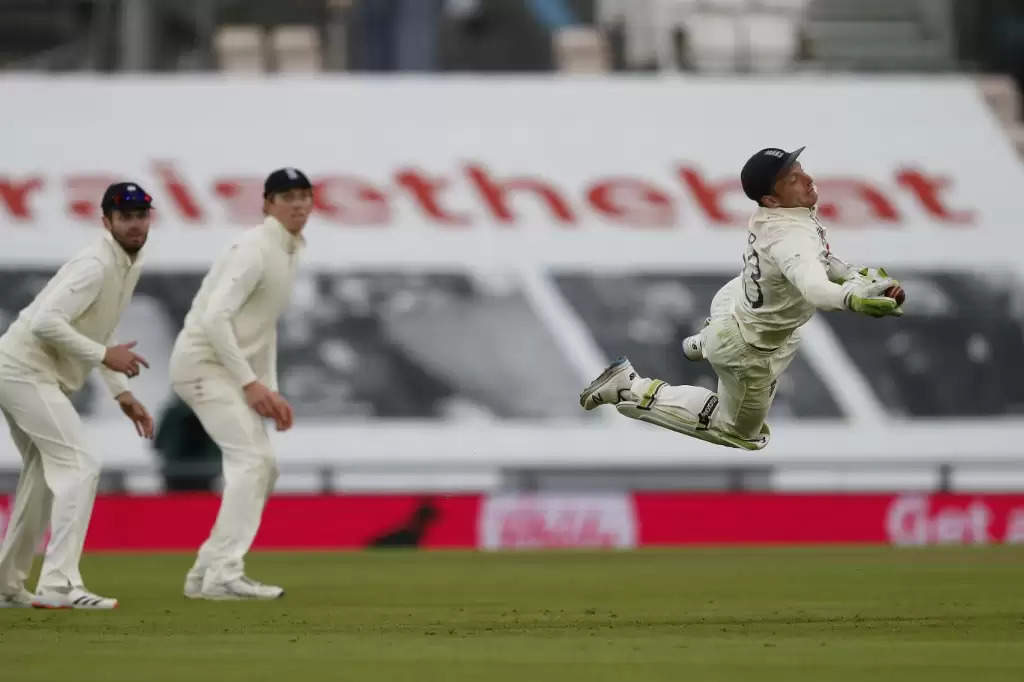Foakes or Buttler? Specialist Keeper or effective batsman? – The Wicket-Keeper conundrum

It is a never-ending debate; whether to play a wicket-keeper purely based on his/her skills with the gloves or based on what more the player offers with the bat. In limited overs, it is a no-brainer these days to play the better batsman.
However, in the longer format, it is still a point of discussion whenever one skill is more prioritised. And, despite winning the ‘Player of the Series’ award in the recent Test series between England and Pakistan, Jos Buttler’s keeping in comparison with his counterpart Mohammad Rizwan has rekindled this discussion.
Before the start of this series, Buttler’s place in the eleven was not even a guarantee. The issue, though, was not his glovework, but his contribution with the bat. He averaged a meagre 24.46 in the 16 matches since January 2019. His record as a keeper, however, looked excellent. According to Cricviz data, from the start of 2016 till the second Test against the West Indies, Buttler’s catch success in Test was 96% – the highest among wicket-keepers who have taken a minimum of 20 catches in the period.

Since the start of 2016, Shane Dowrich has the lowest catch success of any Test wicketkeeper (minimum 20 catches), while England’s Jos Buttler has the highest. #ENGvWI pic.twitter.com/9Y0oR0GiMg
— The CricViz Analyst (@cricvizanalyst) July 24, 2020
However, unlike the batsmen and bowlers, all it takes is one bad match behind the stumps for the wicket-keeper to be questioned for his place in the eleven. And for Jos, all went downhill at Manchester in the first Test against Pakistan. He kept his place in the eleven as the team management wanted him to. Though he made some runs, with the gloves, he had a horror of a Test match.
Also Read: Felt like I owed the team: Jos Buttler
He dropped Shan Masood on 45; missed a stumping while he was at the same score, and watched him score 111 runs more after that. He dropped one more chance, and all three were off Dom Bess – the off-spinner. Soon, the discussion on how poor he was while standing up to the stumps started. And it did not help his case when Rizwan’s keeping to Yasir Shah on the other side was as close as it can get to poetry.
Rizwan is regarded as the best wicket-keeper in Pakistan for a while now. That did not make it easier for him to be the first-choice pick. He couldn’t get a longer run at least until Sarfaraz Ahmed was at the helm. The 28-year-old had to wait in the sidelines just like Ben Foakes is doing for England. However, ever since he broke into the team last year, Rizwan hasn’t looked back.
He made sure that he contributed enough with the bat so that they can’t drop him for a keeper who can bat better. Rizwan averaged 44.25 in Australia last year. Ahead of this England series, he scored a century in the intra-squad warm-up match and was selected as the first-choice keeper despite having Sarfaraz in the squad. In the series against England too, he was good enough to score at an average of 40.25.
Now, Buttler did make up for his mistakes behind the stumps at Manchester with the bat and won them the match along with Chris Woakes while chasing a tricky target. He knew he was under pressure. He knew it could be the last match if he doesn’t do well with the bat. He was aware of the fact that Foakes is just inches away from taking his place in the team.
“I feel like I owed the team,” he said. “I was very aware that the chances I missed as wicketkeeper were the reason we were chasing as many as we were. You sit there thinking ‘perhaps I’ve cost the team the game’. It’s a feeling of relief more than enjoyment at the minute,” said Buttler after the match.
Jos Buttler runs saved/lost per Test by our fielding measures, this series:
— The CricViz Analyst (@cricvizanalyst) August 23, 2020
1st Test – cost 69
2nd Test – cost 3
3rd Test – saved 29#ENGvPAK
He did well in the remaining two matches, and his performance with the gloves went up too. According to the Cricviz fielding metrics, Buttler cost England 69 runs in the first Test, three in the second and saved 29 in the third. He went on to score his second Test century in 47 matches. Not sure how many would have been able to retain their place in the team with that record. And that is the crux of the argument as to why Buttler is backed despite his inconsistency.
In fact, Buttler has played close to half his career as a specialist batsman and not a keeper. He is yet to keep wickets in Asia and Australia – the two places where England would tour in the next year and a half. The last time when England toured in the sub-continent, it was Foakes who kept wickets and he did not do all that bad. He scored a century on debut and was the leading run-scorer of the series against Sri Lanka with 277 runs in six innings at an average of 69.25. He also was the Player of the Series. With the gloves, he was as good as it gets with eight catches and two stumpings.
He played only two more Test matches in the West Indies before handing over the gloves to Buttler. The probable issue is that Foakes batted at seven or eight for England despite batting at five for Surrey in most matches. England had both Buttler and Jonny Bairstow who were playing as specialist batsmen in the top six. If they could use any one of them at six as wicket-keeper, they would be able to play an all-rounder or two like Sam Curran or Woakes at seven.
The debate between playing a specialist keeper and a keeper who has a special ability with the bat is not restricted to England. And it does not happen too often, because there were/are not many like that. To put this into perspective, between 1877 and 1990 there was only one wicket-keeper who played a minimum of 20 matches and averaged more than 40.
Leslie Ames’s record with the bat is legendary. He played for England between 1929 and 1939, and in 44 matches he averaged 43.40 with eight centuries. The second best was Alan Knott who played 95 matches between 1967-1981 at 32.75 and scored five centuries. The role of the wicket-keeper back then was very different because of the way the game was played. Their wicket-keeping skills were prioritised more than anything else. It is freakish to be able to play as a keeper and yet to have a record like Les Ames did.
There is enough literature already on how Adam Gilchrist revolutionised the role of a wicket-keeper. Even before his debut, among those wicket-keepers who played in the 1990s, Andy Flower averaged 53.70, and Alec Stewart averaged in mid-30s, and they were the only two to average above 30. Even then, there was a constant tussle between Jack Russell, who was an artist with the gloves and Stewart who batted better. Ian Healy, again, was impeccable standing up to the stumps and so was Nayan Mongia.
In 1999, Gilchrist happened. The graphic representation of players who made their debut after Gilchrist and played a minimum of 10 matches as the designated wicket-keeper shows how good he was. There is Gilchrist. There is an entire universe.
And then comes MS Dhoni and Matt Prior. Quinton de Kock is getting there. Only Prior, de Kock and BJ Watling average around 40 among those who have effected at least 200 dismissals. Mark Boucher, who made his debut before Gilchrist, has the most number of dismissals (555) and averaged 30.54 over 146 Test matches.
Then there is AB de Villiers, who played 24 matches as designated wicket-keeper and averaged a freakish 57.41. There is no debate about how good he is with the bat. His excellence with the gloves has gone unnoticed because of his batting. If not for his back issues, one might wonder how good he could have been if he had continued to keep wickets.
If there is one thing that is clear from this graph, it is the fact that keepers who are extremely good with the bat are hard to come by. And when they do, the onus is on the team management to back them to the hilt. Rishabh Pant, as a matter of fact, is one such kind. Brilliant with the bat and not perfect with the gloves, particularly to spinners.
Like England, India too is in a conundrum to pick their first-choice gloveman. Pant is ahead of Wriddhiman Saha when it comes to batting. With the gloves, Saha belongs to the club of Healy and Russell. For now, it seems like Indian management is happy to play Saha in the sub-continent and Pant overseas as the latter has done extremely well in both England and Australia.
The advantage that Pant has and Buttler doesn’t is age. Pant is 22 while his competitor Saha is 35. Sooner than later, Pant will be taking over as primary wicketkeeper in Tests. Whereas, Buttler turns 30 next month and Foakes is three years younger.
Buttler’s role in the limited-overs setup is even more crucial for England, as he is arguably the best One-Day batsman they have ever produced. He averages 40.88 at an insane strike-rate of 119.83. He is also the deputy of Eoin Morgan, and he might as well lead the team in a year or two.
While the England team management would want to make the most out of Buttler’s ability in Tests, they would be more cautious that it does not affect his form in LOIs. And for Buttler, because of all these factors, every Test he plays would be crucial. The moment he has a bad match with the gloves, this debate will start all over again. One can only hope that it doesn’t for the delight of watching Buttler bat.

